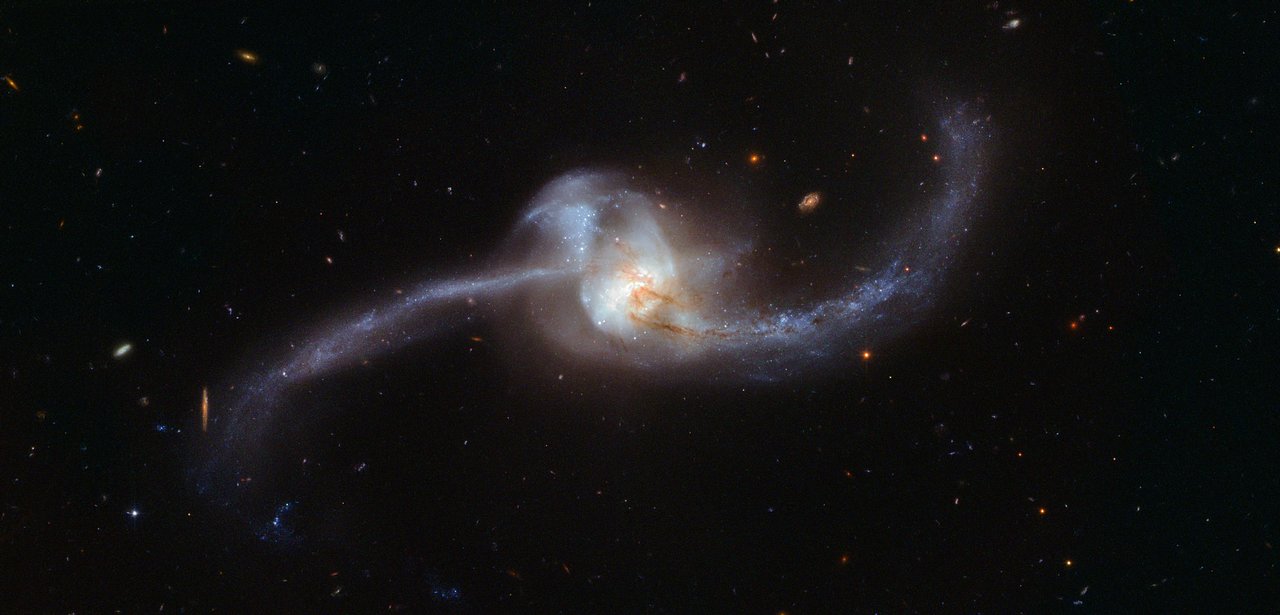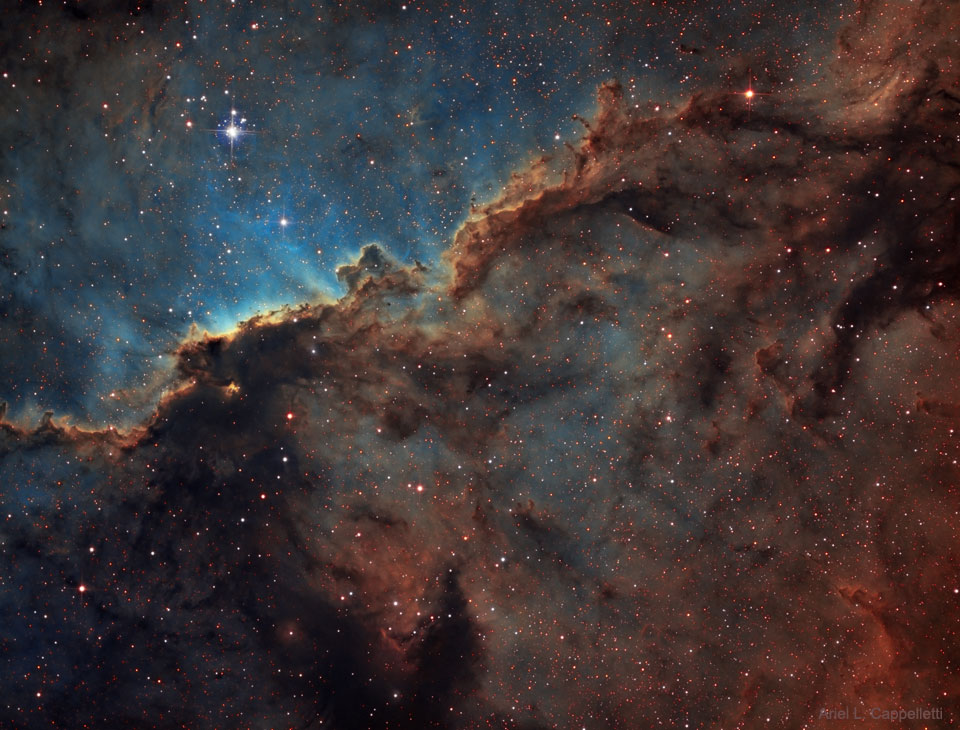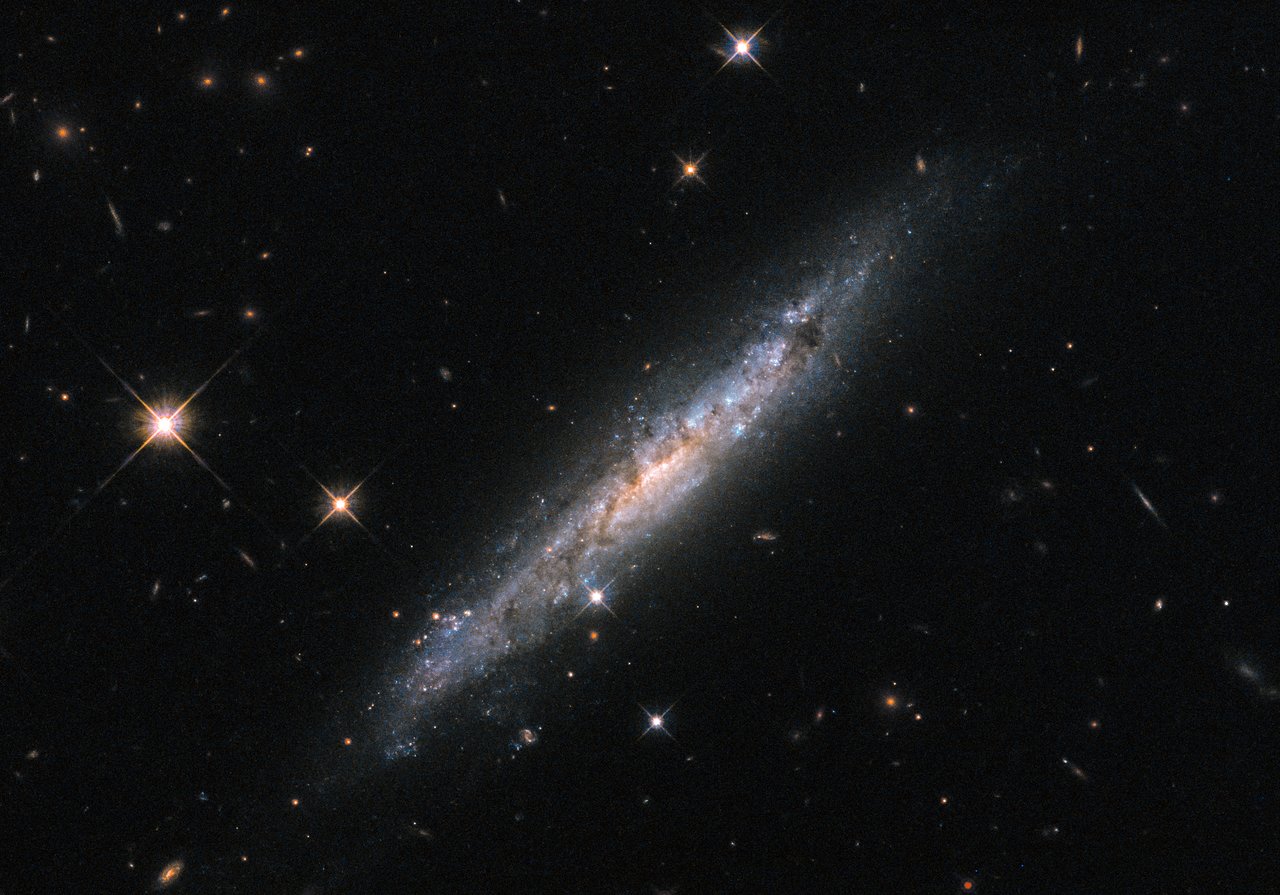Blog
This image, captured by the NASA/ESA Hubble Space Telescope, shows what happens when two galaxies become one. The twisted cosmic knot seen here is NGC 2623 — or Arp 243 — and is located about 250 million light-years away in the constellation of Cancer (The Crab).
NGC 2623 gained its unusual and distinctive shape as the result of a major collision and subsequent mergerbetween two separate galaxies. This violent encounter caused clouds of gas within the two galaxies to become compressed and stirred up, in turn triggering a sharp spike of star formation. This active star formation is marked by speckled patches of bright blue; these can be seen clustered both in the centre and along the trails of dust and gas forming NGC 2623’s sweeping curves (known as tidal tails). These tails extend for roughly 50 000 light-years from end to end. Many young, hot, newborn stars form in bright stellar clusters — at least 170 such clusters are known to exist within NGC 2623.
NGC 2623 is in a late stage of merging. It is thought that the Milky Way will eventually resemble NGC 2623 when it collides with our neighbouring galaxy, the Andromeda Galaxy, in four billion years time.
In contrast to the image of NGC 2623 released in 2009 (heic0912), this new version contains data from recent narrow-band and infrared observations that make more features of the galaxy visible.

Joe Beck (July 29, 1945 – July 22, 2008) was an American jazz guitarist who was active for over 30 years.
Born in Philadelphia, Beck moved to Manhattan in his teens, playing six nights a week in a trio setting, which gave him an opportunity to meet various people working in the thriving New York music scene. By the time he was 18, Stan Getz hired him to record jingles, and in 1967 he recorded with Miles Davis. By 1968, at age 22, he was a member of the Gil Evans Orchestra.
https://www.youtube.com/watch?v=1kqm3LHosKs
more...Charles Henry Christian (July 29, 1916 – March 2, 1942) was an American swing and jazz guitarist.
Christian was an important early performer on the electric guitar and a key figure in the development of bebop and cool jazz. He gained national exposure as a member of the Benny Goodman Sextet and Orchestra from August 1939 to June 1941. His single-string technique, combined with amplification, helped bring the guitar out of the rhythm section and into the forefront as a solo instrument. John Hammond and George T. Simon called Christian the best improvisational talent of the swing era. In the liner notes to the album Solo Flight: The Genius of Charlie Christian (Columbia, 1972), Gene Lees wrote that “Many critics and musicians consider that Christian was one of the founding fathers of bebop, or if not that, at least a precursor to it.”
Christian’s influence reached beyond jazz and swing. In 1990, he was inducted into the Rock and Roll Hall of Fame in the category Early Influence.
In 2006 Oklahoma City renamed a street in its Bricktown entertainment district “Charlie Christian Avenue” (Christian was raised in Oklahoma City and was one of many musicians who jammed along the city’s “Deep Deuce” section on N.E. Second Street).
Christian was born in Bonham, Texas. His family moved to Oklahoma City, Oklahoma, when he was a small child. His parents were musicians. He had two brothers, Edward, born in 1906, and Clarence, born in 1911. All three sons were taught music by their father, Clarence Henry Christian. Clarence Henry was struck blind by fever, and in order to support the family he and the boys worked as buskers, on what the Christians called “busts.” He would have them lead him into the better neighborhoods, where they would perform for cash or goods. When Charles was old enough to go along, he first entertained by dancing. Later he learned to play the guitar, inheriting his father’s instruments upon his death when Charles was 12.
https://www.youtube.com/watch?v=IID2JPnGF00
more...Donald Matthew Redman (July 29, 1900 – November 30, 1964) was an American jazz musician, arranger, bandleader, and composer.
Redman was born in Piedmont, Mineral County, West Virginia. His father was a music teacher, his mother was a singer. Don began playing the trumpet at the age of three, joined his first band at the age of six and by the age of 12 was proficient on all wind instruments ranging from trumpet to oboe as well as piano. He studied at Storer College in Harper’s Ferry and at the Boston Conservatory, then joined Billy Page’s Broadway Syncopaters in New York City. He was the uncle of saxophonist Dewey Redman, and thus great-uncle of saxophonist Joshua Redman and trumpeter Carlos Redman.
more...https://www.youtube.com/watch?v=rGJcbHni4rc
more...NGC 6188 are tens of light-years long. The emission nebula is found near the edge of an otherwise dark and large molecular cloud in the southern constellation Ara, about 4,000 light-years away. Born in that region only a few million years ago, the massive young stars of the embedded Ara OB1 association sculpt the fantastic shapes and power the nebular glow with stellar winds and intense ultraviolet radiation. The recent star formation itself was likely triggered by winds and supernova explosions, from previous generations of massive stars, that swept up and compressed the molecular gas. The featured image accumulated over 10 hours through a backyard telescope in Córdoba, Argentina and was false-colored using the Hubble palette highlighting emission from sulfur, hydrogen, and oxygen atoms in red, green, and blue hues. The field of view spans about four full Moons, corresponding to about 150 light years at the estimated distance of NGC 6188.

Delfeayo Marsalis (/ˈdɛl fiː oʊ/; born July 28, 1965) is an American jazz trombonist, record producer and educator.
Marsalis was born in New Orleans, the son of Dolores (née Ferdinand) and Ellis Louis Marsalis, Jr., a pianist and music professor. He is also the grandson of Ellis Marsalis, Sr., and the brother of Wynton Marsalis (trumpeter), Branford Marsalis (saxophonist), and Jason Marsalis (drummer). Delfeayo also has two brothers who are not musicians: Ellis Marsalis III (b. 1964) is a poet, photographer and computer networking specialist based in Baltimore, and Mboya Kenyatta (b. 1970) is autistic and was the primary inspiration for Delfeayo’s founding of the New Orleans-based Uptown Music Theatre. Formed in 2000, UMT has trained over 300 youth and staged eight original musicals, all of which are based upon the mission of “community unity”.
more...Michael Bernard Bloomfield (July 28, 1943 – February 15, 1981) was an American guitarist and composer, born in Chicago, Illinois, who became one of the first popular music superstars of the 1960s to earn his reputation almost entirely on his instrumental prowess, since he rarely sang before 1969. Respected for his guitar playing, Bloomfield knew and played with many of Chicago’s blues musicians before achieving his own fame and was instrumental in popularizing blues music in the mid-1960s. He was ranked No. 22 on Rolling Stone‘s list of “100 Greatest Guitarists of All Time” in 2003 and No. 42 by the same magazine in 2011. He was inducted into the Blues Hall of Fame in 2012 and, as a member of the Paul Butterfield Blues Band, was inducted into the Rock and Roll Hall of Fame in 2015.
Bloomfield was born into a wealthy Chicago Jewish-American family. Bloomfield’s father, Harold Bloomfield, was born in Chicago in 1914. After pursuing business ventures in California during the 1920s, he returned to the city in the early 1930s. Harold Bloomfield began manufacturing restaurant supplies, and by the latter part of the decade his company, Bloomfield Industries, was making pie cases, kitchen utensils, salt and pepper shakers, and sugar pourers. By the early 1940s Bloomfield Industries had acquired more manufacturing and warehouse space. The company expanded during World War II by manufacturing supplies needed for the war effort. Working with his brother, Daniel, and his father, Samuel, Harold Bloomfield built up Bloomfield Industries into a thriving business. Michael Bloomfield’s mother was born Dorothy Klein in Chicago in 1918 and married Harold Bloomfield in 1940. She came from an artistic, musical family, and worked as an actor and a model before marrying Bloomfield.
more...Jimmy “Duck” Holmes (born July 28, 1947) is an American blues musician and proprietor of the Blue Front Cafe on the Mississippi Blues Trail, the oldest surviving juke joint in Mississippi. Holmes is known as the last of the Bentonia bluesmen, as he is the last blues musician to play the Bentonia School. Like Skip James and Jack Owens and other blues musicians from Bentonia, Mississippi, Holmes learned to play the blues from Henry Stuckey, the originator of the Bentonia blues. Holmes’ music is based in the Bentonia tuning utilizing open E-minor, open D-minor and a down tuned variant, and is noted for its haunting, ethereal, rhythmic and hypnotic qualities. His eighth album, It Is What It Is, on Blue Front Records has been praised by fans and music critics who have called it: “addictive” and “obsession worthy,” “as gritty, stark and raw as one could imagine” and “absolutely hypnotic,” and “an essential modern recording.”
Jimmy Charles Holmes was born in Yazoo County, Mississippi, United States, to Carey and Mary Holmes at their home in Bentonia, Mississippi. Holmes’ parents were sharecroppers, who opened the Blue Front Cafe in 1948, the year after he was born. They had ten children, but also raised four grandchildren when one of their daughters died.
more...David “Junior” Kimbrough (July 28, 1930 – January 17, 1998) was an American blues musician. His best-known works are “Keep Your Hands off Her” and “All Night Long”.
Kimbrough was born in Hudsonville, Mississippi, and lived in the north Mississippi hill country near Holly Springs. His father, a barber, played the guitar, and Junior picked his guitar as a child. He was apparently influenced by the guitarists Lightnin’ Hopkins, Mississippi Fred McDowell and Eli Green (who had a reputation as a dangerous voodoo man).
In the late 1950s Kimbrough began playing the guitar in his own style, using mid-tempo rhythms and a steady drone played with his thumb on the bass strings. This style would later be cited as a prime example of hill country blues. His music is characterized by the tricky syncopation between his droning bass strings and his midrange melodies. His soloing style has been described as modal and features languorous runs in the middle and upper registers. The result was described by music critic Robert Palmer as “hypnotic”. In solo and ensemble settings it is often polyrhythmic, which links it to the music of Africa. North Mississippi bluesman and former Kimbrough bassist Eric Deaton suggested similarities between Kimbrough’s music and that of Fulani musicians such as Ali Farka Touré. The music journalist Tony Russell wrote that “his raw, repetitive style suggests an archaic forebear of John Lee Hooker, a character his music shares with that of fellow North Mississippian R. L. Burnside“.
In 1966 Kimbrough traveled to Memphis, Tennessee, to record for Goldwax Records, owned by the R&B and gospel producer Quinton Claunch. Claunch was a founder of Hi Records and is known as the man who gave James Carr and O.V. Wright their starts. Kimbrough recorded one session at American Studios. Claunch declined to release the recordings, deeming them too country. Some forty years later, Bruce Watson, of Big Legal Mess Records, approached Claunch to buy the original master tapes and the rights to release the recordings made that day. These songs were released by Big Legal Mess Records in 2009 as First Recordings.
more...Charles Reed “Charlie” Biddle, CM (July 28, 1926 – February 5, 2003) was an American-Canadian jazz bassist. He lived most of his life in Montreal, organizing and performing in jazz music events.
Biddle was born and grew up in West Philadelphia. He served in the United States Armed Forces during World War II, serving in China, India and Burma. After the war, he studied music at Temple University in Philadelphia, where he started playing bass.
In 1948, Biddle arrived in Montreal while touring with Vernon Isaac’s Three Jacks and a Jill. Biddle was impressed by the fact that in Canada, particularly Quebec, black jazz musicians often played alongside white jazz musicians as friends and bandmates. He decided to settle down in Montreal, and fell in love with a French-Canadian woman, Constance. The two eventually married and raised three daughters – Sonya, Stephanie and Tracy – and a son, Charles Biddle Jr.
Biddle was employed as a car salesman from 1954 to 1972, while performing with pianists Charlie Ramsey, Milt Sealey, Alfie Wade, Sadik Hakim, and Stan Patrick in local Montreal nightclubs. He became a promoter, and booked musicians Johnny Hodges, John Coltrane, Pepper Adams, Bill Evans, Art Farmer, Tommy Flanagan and Thad Jones to perform in Montreal. He performed occasionally with guitarist Nelson Symonds between 1959 and 1978. Between 1961 and 1963 the pair performed together under Biddle’s leadership at Dunn’s and La Tête de l’Art, and under Symonds’ leadership at the Black Bottom from 1964 to 1968. As a duo they performed at several resort communities in the Laurentians between 1974 and 1978.
more...ESO 580-49, may seem tranquil and unassuming, but this spiral galaxy actually displays some explosive tendencies.
In October of 2011, a cataclysmic burst of high-energy gamma-ray radiation — known as a gamma-ray burst, or GRB — was detected coming from the region of sky containing ESO 580-49. Astronomers believe that the galaxy was the host of the GRB, given that the chance of a coincidental alignment between the two is roughly 1 in 10 million. At a distance of around 185 million light-years from Earth, it was the second-closest gamma-ray burst(GRB) ever detected.
Gamma-ray bursts are among the brightest events in the cosmos, occasionally outshining the combined gamma-ray output of the entire observable Universe for a few seconds. The exact cause of the GRB that probably occurred within this galaxy, catalogued as GRB 111005A, remains a mystery. Several events are known to lead to GRBs, but none of these explanations appear to fit the bill in this case. Astronomers have therefore suggested that ESO 580-49 hosted a new type of GRB explosion — one that has not yet been characterised.

More Posts
- The Cosmos with Hercules A
- Johnny Nash Day
- Ginger Baker Day
- Jimmy Rowles Day
- World Fusion with SANS
- Daily Roots with Marcia Griffiths
- The Cosmos with E0102
- Oscar Brashear Day
- Enoch Light Day
- World Music with Fela Kuti
- Daily Roots with Scientist
- The Cosmos with RCW 38
- Luther Allison Day
- Duke Pearson Day
- Ike Quebec Day
- World Music with Paco de Lucia
- Daily Roots with the Skatalites
- Aretha Franklin Passes at 76
- The Cosmos with IC 5201
- Bill Evans Day